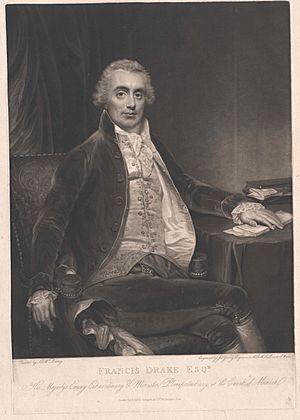Francis Drake (diplomat) facts for kids
Francis Drake (1764–1821) was a British diplomat who worked for his country in different parts of Europe. He held important jobs in cities like Genoa and Munich during a time of big wars called the Napoleonic Wars. He came from places in England called Yardbury and Wells.
Contents
Who Was Francis Drake?
Francis Drake was born in 1764. His father, also named Francis Drake, was a vicar, which is a type of church leader, in the towns of Seaton and Beer.
Starting His Diplomatic Career
In 1790, Francis Drake began his career as a diplomat. His first important role was as a Secretary of Legation in Copenhagen, Denmark. This meant he helped the main ambassador represent Britain in that country.
Later, he moved to Venice, Italy, where he became a Minister Resident. This was another important job where he represented Britain's interests. By 1793, he was working as an envoy in Genoa, Italy. An envoy is like a special messenger or representative from one country to another.
Important Roles in Europe
In 1795, Francis Drake took a break from his work to return to England and get married. After that, his career continued to grow.
In 1799, he was given even bigger responsibilities. He became an Envoy Extraordinary to the Elector Palatine. This was a powerful ruler in a part of Germany. He also became a Minister to the Diet of Ratisbon. The Diet of Ratisbon was like a big meeting or parliament for different states in the Holy Roman Empire.
Secret Communications and Challenges
As a diplomat, Francis Drake often communicated with people who shared secret information about France. This was during a time when Britain and France were often in conflict.
In 1804, some of these secret letters were found by the French government. These letters talked about plans for an uprising, which is like a rebellion, in a part of Germany. When the French government found these letters, they shared them with other countries' leaders in Paris. This caused a difficult situation for Francis Drake, as his secret communications were made public. It showed how tricky and sometimes risky the job of a diplomat could be, especially during wartime.
 | John T. Biggers |
 | Thomas Blackshear |
 | Mark Bradford |
 | Beverly Buchanan |


